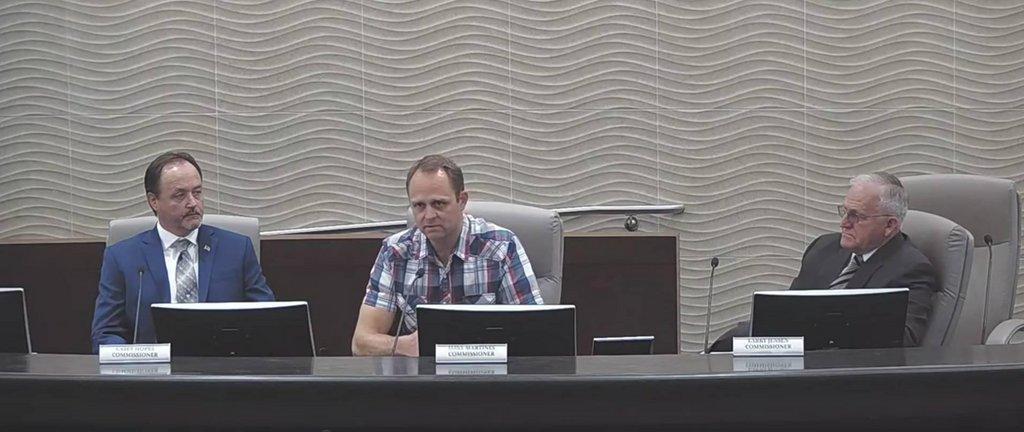To contribute to the prevention of spreading COVID-19 in the area, the Carbon County Commissioners hosted their Wednesday evening meeting in a private manner. While the public was not invited to attend the meeting, it was live streamed for viewing as usual.
To kick off the meeting, the commissioners welcomed a number of local experts to weigh in on the current coronavirus situation while acknowledging the Southeast Utah Health Department Declaration of Local Public Health Emergency. Commissioner Chair Tony Martines expressed that the purpose is to provide any funding that may come from the federal government and that small businesses will have the opportunity to apply for low interest loans that have been identified and opened from the governor.
Commissioner Martines stressed that the declaration was not meant to cause panic. The commissioners then welcomed Carbon County Emergency Manager Justin Needles, who stated that there are currently no cases of COVID-19 in Carbon County. He explained almost all of the panic is coming from the community members themselves and he encouraged all to limit what they purchase. “We’re asking people to buy what they normally buy,” Needles stated.
He continued by explaining that the only way supply is disrupted is if people panic buy. He requested that all be responsible of those around them and to offer any assistance possible to the elderly.
Bradon Bradford of the Southeast Utah Health Department (SEUHD) then spoke, beginning by stating that he understands that the last two weeks have been a whirlwind for all. He gave the public health perspective of where the county is and where all are headed. In Utah, as of 1 p.m. on March 18, there were 53 positive cases. Bradford stated that one of the more interesting aspects is that Salt Lake City has the most with Summit County having the second most. Many of the cases are travel-related.
Following this, Bradford explained that after observing the trend of cases in the United States, he felt concern to be proactive in protecting the community from uncontrolled spread of the disease. He does anticipate positive cases in the area but believes that these measures will help to really reduce the potential spread of disease in the community. Bradford expressed that it was a painful decision to make and they will look at businesses and try to find where there can be limited interaction with customers based on their ability to provide social distancing.
Many asked why there is the need for the bigger measures, which Bradford stated is partly due to so much being learned about the disease so quickly. “This was done in reaction to what we do know, instead of what we don’t know,” Bradford stated. He continued by stating that he is grateful that businesses that have been affected have been proactive with partnering with the SEUHD though they are facing economic loss. They are constantly looking for solutions to the potential outbreak.
Following Bradford, Castleview Hospital CEO Greg Cook took to the microphone. He stated that it is important for all to understand that Castleview is prepared and committed to protect the community’s well-being. Hospital staff prepared to treat any influx of patients received and plan for it on a routine basis. The hospital runs mock drills quite often; recently, they chose to implement the emergency procedure.
Teams meet multiple times a day, including representatives of the emergency management services, local officials, members of the Center for Disease Control (CDC) and more. “I’m very pleased with the community support we’ve received,” stated Cook.
As the situation evolves, so does the response. Out of an abundance of caution, visitors are no longer permitted at the hospital until further notice, with few exceptions. All common areas such as the Jeff Manley Wellness Center, gift shop and cafeteria are closed. Access to the hospital has been restricted to the emergency entrance only and a screening is conducted for all that enter the hospital. Cook assured that his team of employees and physicians are all trained and prepared.
The hospital will continue to offer urgent and emergency care. After Cook’s conclusion, two local doctors also weighed in on the issue. Symptoms of COVID-19 include fever, cough, body aches and in rare cases, diarrhea. More than 80 percent of those that contract the disease will recover. COVID-19 can be treated with Tylenol, Motrin, rest, fluids and a home quarantine. However, those with difficulty breathing, shortness of breath and mental confusion tacked on must seek medical attention.
Those that contract COVID-19 with the normal symptoms are safe to re-enter society following seven days of sickness and 72 hours without a fever. The community was encouraged to follow protocol and protect one another.
To conclude, Commissioner Martines read the Declaration of Emergency.


